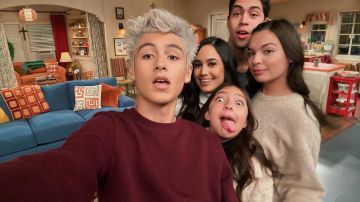‘One Day At a Time’ Star Isabella Gomez Gets Real About the Colorism in Hollywood
One Day At a Time is coming back for its fourth season in 2020 and fans are stoked! It would be an understatement to say how rare shows like ODAAT really are and how important it is for Latinx to be portrayed as full multifaceted people

Photo: Instagram/itsmarcelruiz
One Day At a Time is coming back for its fourth season in 2020 and fans are stoked! It would be an understatement to say how rare shows like ODAAT really are and how important it is for Latinx to be portrayed as full multifaceted people. One thing in particular that has made the sitcom so beloved is the progressive way it deals with everything from mental illness and gentrification to homophobia and racism.
These are things that might not seem too out of the box considering the times but ODAAT is touching on subjects that are still very much taboo in the Latinx community at large. A lot of that taboo has to do with cultural mores that are really just prejudice disguised as tradition. A lot of it has to do with hundreds of years of colonization and white supremacy. But in 2019 there have been so many internal conversations about identity brewing within the Latinx community that it can be dizzying to determine just how things are developing.
The complexities of race, ethnicity, and nationality within the Latinx community are — to put it simply — fundamentally misunderstood by pretty much everyone, especially when it comes to representation in Hollywood. Colombian born actress Isabella Gomez, who plays Elena Alvarez on ODAAT says, she didn’t think her success on the show would also limit the roles she was seen fit to play.
Gomez says that early in her career being white-passing allowed her to land roles that were not explicitly written as Latinx. But now that she’s more well known for her character Elena, she’s not getting the callbacks for non-Latinx parts.
“It’s really frustrating especially because I know the world where I get the auditions for everything regardless of the ethnicity, so to get that taken away from you it shows the contrast even more because you know? There are a lot of my Latinx sisters that have been that way all their lives and don’t know what it’s like to get the auditions — and I know both worlds,” She told HipLatina.
Which begs the question: Can a Latina play a character not explicitly written as Latina? The answer is obviously yes, especially since it’s no secret that the roles that are meant to be played by people of color are usually given to white actors anyways. It doesn’t seem to bother Hollywood when Scarlett Johansson and Emma Stone play Asian roles. And Latinos like Alexis Bledel, Frankie Muniz, and Cameron Diaz have made their careers playing non-Latinx roles — so what gives?
“There are so many roles that aren’t specifically Latinx or white or Black that anyone could play but because people are so used to only casting white and the token POC or like only casting POC as the best friend or the side characters, that as soon as they know that I’m Latinx they don’t see me as a leading lady anymore and that’s awful. But I know that I am privileged in that I have lighter skin and I know my opportunities are way more abundant than an Afro-Latinx woman,” Gomez stated.

There are various panels, forums, and organizations like The National Association of Latino Independent Producers (NALIP) that focus entirely on diversity and the inclusion of Latinx in Hollywood. Gomez recently spoke about what it’s like to portray an authentic Latinx voice in Hollywood alongside fellow actresses Emily Tosta (“Party of Five”) and Sasha Calle (“The Young and the Restless”). But as we have been reminded year after year the parts for Latinx are few, the pay gap is real, and the stereotypes continue. A 2019 USC study found Latino actors represented only three percent of lead or co-lead roles in top-performing movies during the last 12 years.
Over 100 top-grossing movies from 2007-2018, only 3% of films featured leads or co-leads with Latino actors and only 4.5% of the 47,268 speaking roles studied were Latino. 24 percent of all Latino speaking characters and 28% of top-billed Latino talent were depicted as criminals and overall 61.9 percent of all on-screen characters were shown as drug dealers and gang members.

















